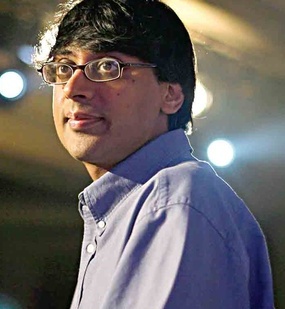
Indian children with a bent for mathematics need to be encouraged to pursue the subject rather than being pushed into engineering and other fields, suggests Princeton University professor Manjul Bhargava. The first Indian-origin-winner of the Fields Medal, the highest honour for a mathematician, is steeped in Indian culture despite having grown up in Canada and the US. He's well-versed in Hindi and Sanskrit and is an accomplished tabla player, having learnt under Zakir Hussain. He is also closely involved with mathematics in India as a regular visitor to the country's premier institutions. In an email interview with Hari Pulakkat, Bhargava spoke about math in India and his ambition to encourage talent in the country:
As a person of Indian origin, what does this award mean to you?
I am, of course, very honoured to be a recipient of the Fields Medal; beyond that, it is a source of encouragement and inspiration, and I hope that it is so also for my students and collaborators and colleagues who work with me. Needless to say, this is their prize too.
I hope it may also inspire more young people in India to take up mathematics and the sciences, in general. India has a great legacy in mathematics and it ought to continue.
How do you look at the mathematics' scene in India today?
Unfortunately, today mathematics talent is not encouraged and cultivated as much in India, compared to the US and Europe. The sheer amount of mathematics talent in India is incredible, but most students talented in mathematics are encouraged to move to engineering or other fields. Mathematics is often not considered a career option. I think this is a mistake. All students should be encouraged to do what they enjoy best, and we must make the opportunities available for them to do this. This is my main suggestion for schools in India: encourage students to pursue their talents and interests, whatever they may be, and foster these talents with opportunities to pursue them.
With the new institutes called IISERs (Indian Institutes of Science Education and Research) throughout India, there are already more opportunities for scientific research in India than ever before, so this is indeed a perfect time for young people in India to pursue science, but more needs to be done. I hope to be involved in helping with this process in India in the future as well.
How important, in your opinion, is mathematics in Indian culture?
Mathematics and mathematical thinking have been an important aspect of Indian culture for a long time. From ancient philosophical verses like "Poornasya poornamaadaaya poornamevaavashishyate" (Infinity minus infinity can still be infinity) that reflect mathematical thinking, to the inherently mathematical structure of the alphabets and phonetics of Indian languages, to the discovery of zero and negative numbers, combinatorics, trigonometry, calculus, and more - so much mathematics has been discovered for ages in a way that is deeply intertwined in Indian culture.
What advice would you give a young student trying to learn mathematics in India?
I would simply advise budding and upcoming mathematicians to think about, read about, take courses in and work on the mathematics that they personally find most beautiful, exciting, enjoyable and promising at that moment; everything else will then fall into place. If you truly enjoy and are passionate about what you are doing, you will do great work!
Mathematics can be used to represent your art